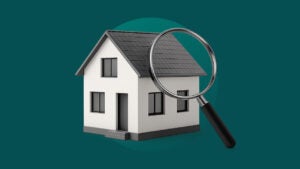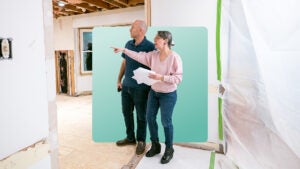Bankrate’s 2025 Home Affordability Report

For many American homeowners, the decision to buy a home has worked out well. Seven out of 10 (70 percent) say they would buy their current home again, according to Bankrate’s 2025 Homeowner Regrets Survey. That’s in line with a similar survey in 2024 that found 69 percent of homeowners felt the same way.
Bankrate conducted several surveys in the last year with polling agency YouGov Plc to keep up with the country’s changing opinions on homebuying. In each poll, Bankrate surveyed more than 2,000 Americans aged 18 and older on topics like home affordability and what homeowners regret about their home purchases. The resulting data, weighted to represent all U.S. adults, shines a light on Americans’ struggles with the high costs of homeownership.
For example, while most homeowners are happy with their choice, many feel some level of remorse. The biggest gripe is ongoing maintenance and hidden costs being more expensive than expected, cited by 42 percent of homeowners with at least one regret about their purchase.
For most folks, buying a home is the most expensive transaction of their lifetime. After the purchase is complete, we find that affordability issues rank high on the list of regrets.— Mark Hamrick, Senior Economic Analyst, Bankrate
Bankrate’s key insights on homebuying
Of homeowners who have at least one regret about buying their current home, the most common is that maintenance and other hidden costs were more expensive than expected, cited by 42 percent of homeowners.
Source: Bankrate’s 2025 Homeowner Regrets Survey
Altogether, 82 percent of Americans say owning a home is part of the American Dream.
Source: Bankrate’s 2025 Home Affordability Survey
Fully 81 percent of aspiring homeowners — U.S. adults who have owned a home in the past or never owned a home but want to — say down payment and closing costs pose a “very significant” or “somewhat significant” obstacle to owning a home some day.
Source: Bankrate’s 2025 Down Payment Survey

Bankrate data center
Since 1976, Bankrate has been the go-to source for personal finance data, publishing average rates on the most popular financial products and tracking the experience of consumers nationwide.
See moreHomebuying regrets are common, particularly high maintenance costs
Looking back on their home purchase, homeowners with regrets most commonly cite maintenance and other hidden costs being more expensive than they anticipated (42 percent), according to our 2025 Homeowner Regrets Survey, up from 40 percent in 2024. Other regrets include buying too small a house (21 percent), their mortgage payment being too high (16 percent), overpaying/paying too much (15 percent), buying a house in a bad location (14 percent), buying too big a house (11 percent), not getting the best mortgage rate (10 percent) and not thinking it’s a good investment (6 percent):
Notes: Respondents could select more than one response; Percentages are among those who have a regret about purchasing their current home.
Source: Bankrate survey, April 2-4, 2025
“For most folks, buying a home is the most expensive transaction of their lifetime,” says Mark Hamrick, senior economic analyst at Bankrate. “After the purchase is complete, we find that affordability issues rank high on the list of regrets. While homeownership is still associated with the proverbial American dream, it is prudent to consider and plan for the many ongoing costs of ownership, not just getting over the threshold of the down payment and settlement.”
If given the chance, over 2 in 3 homeowners would buy their house again
Despite regrets, most American homeowners (70 percent) would buy their current home if they had to do it over again, according to our 2025 Homeowner Regrets Survey. Seventeen percent of American homeowners said they wouldn’t buy their current home again and 13 percent said they didn’t know.
Three–quarters (75 percent) of millennial homeowners and 71 percent of Gen X homeowners say, if they had to do it over again, they would still buy their current home. That’s compared to 62 percent of Gen Z homeowners and 67 percent of baby boomer homeowners.
Note: Percentages are among U.S. homeowners
Source: Bankrate survey, April 2-4, 2025
Homeownership key part of the American Dream for most
Homeownership and the security that comes with it has historically been considered a part of the American Dream. That still seems to be the case, with 82 percent of U.S. adults saying they consider owning a home to be part of the American Dream, according to our 2025 Home Affordability Survey — more so than being able to retire (71 percent) or having a successful career (66 percent), among other options.
Gen Xers and baby boomers are most likely to believe owning a home is part of the American Dream (84 percent and 89 percent, respectively). Gen Zers (78 percent) and millennials (74 percent) also place a high value on homeownership. Both cohorts say it trumps other hallmarks of financial success.
“Americans consider homeownership to be the cornerstone of the American Dream, more so than anything else,” says Greg McBride, CFA, former chief financial analyst for Bankrate. “This belief hasn’t wavered and has only gotten stronger despite increasing affordability challenges with a record high percentage of Americans, 82 percent, citing homeownership as part of the American Dream.”
More than three-quarters of non-homeowners point to unaffordability
Most U.S. adults (83 percent) who don’t own a home but desire to cite affordability-related reasons as holding them back, according to our 2025 Home Affordability Survey. Specifically, they cite not having enough income (59 percent), home prices being too high (55 percent) and not being able to afford a down payment and closing costs (46 percent). (Respondents could choose more than one factor.)
“With household budgets already strained from elevated inflation and so many Americans living paycheck to paycheck, it comes as no surprise that aspiring homeowners point to insufficient income, high home prices and being unable to afford the down payment and closing costs as the major obstacles to homeownership,” McBride says.
Gen Xers who don’t own a home but desire to are the most likely generation to say too much debt is keeping them from purchasing one (20 percent), compared to 17 percent of millennials, 12 percent of Gen Z and 13 percent of baby boomers. Gen Zers who don’t own a home but desire to were the most likely generation to say they just aren’t ready yet (42 percent).
Close to two-thirds of Americans would make a change for more affordable housing
Sixty-four percent of Americans would be willing to do something to find more affordable housing. Many would be willing to downsize their living space (29 percent) or move out of state (24 percent), according to our 2025 Home Affordability Survey. Some would be willing to move farther from family and friends (19 percent) or buy a fixer-upper (18 percent).
Across most generations, the top sacrifice for more affordable housing would be downsizing, cited by 26 percent of baby boomers, 32 percent of Gen Xers and 29 percent of millennials. The exception is Gen Zers, who most commonly say they’d be willing to move out of state (32 percent).
“Moving out of state, farther from family and friends or buying a fixer-upper each come with their own set of additional costs, further hampering the search for affordable housing,” McBride says.
Down payment and closing costs still pose a challenge
More than 4 in 5 (81 percent) of prospective buyers say the one-two punch of the expense of the down payment and closing costs is standing in their way, according to our 2025 Down Payment Survey. Fifty-two percent call the obstacle “very significant” and 29 percent refer to it as “somewhat significant.”
Among those not deterred by the down payment and closing costs, 8 percent describe the expense as “not very significant,” while 2 percent say it’s “not significant at all.”
Some aspiring homeowners not hopeful they’ll ever be able to save enough
For some aspiring homeowners, the challenges seem insurmountable. Twenty percent say they’ll never be able to save enough for a down payment on a home, according to our 2025 Down Payment Survey, unchanged from our 2024 survey.
Meanwhile, 12 percent say they’ll need 10 or more years; 9 percent say they’ll need 7 to 10 years; 11 percent say they’ll need 5 to 7 years; and 20 percent say they’ll need 3 to 5 years. Just 4 percent expect to have enough saved within a year, while 11 percent say they’ll have enough saved within 1-2 years.
Separately, 22 percent of all American adults say they’ll never be able to afford their dream home, according to the latest Down Payment Survey. Among age cohorts, 29 percent of Generation X (ages 45-60) say they’ll never be able to afford their dream home, followed by 24 percent of millennials (ages 29-44), 20 percent of Gen Z (ages 18-28) and 18 percent of baby boomers (ages 61-79).
Americans slightly more optimistic about housing market
Forty percent of Americans believe now is a bad time to buy a home, according to our 2025 Down Payment Survey, a decrease from 42 percent in our 2024 survey.
Among other housing market headwinds, more than 2 in 5 (42 percent) say a buyer needs excellent credit to get a mortgage, while 41 percent say they think mortgage rates will remain elevated for the foreseeable future. Meanwhile, 18 percent say that renting is cheaper than owning a home.
Current homeowners got there through intentional savings
When asked how they came up with the down payment and closing costs on their first home, 44 percent of current homeowners say they saved specifically for that purpose, according to our 2025 Down Payment Survey. A smaller subset — 17 percent — say they used a first-time homebuyer grant or loan assistance program, and 15 percent received a monetary gift from family or friends. Meanwhile, 10 percent say they found an additional source of income, 8 percent say they took money out of retirement savings and 6 percent say they sold personal items such as jewelry, electronics or cars.
In last year’s survey, just 41 percent of owners credited saving, while 14 percent reported receiving gifts from family and friends and 9 percent said they tapped retirement savings.
Bottom line
If you’re a first-time homebuyer determined to buy this year, there are a few options available to you, even if you don’t have a hefty down payment saved. Check your state’s housing finance agency to see if you’re eligible for loans or grants for your down payment and closing costs. Several big banks and nonprofits also offer down payment help.
Purchasing your first home can be intimidating, but there are options to help you achieve this big step in your financial journey.
Why we ask for feedback Your feedback helps us improve our content and services. It takes less than a minute to complete.
Your responses are anonymous and will only be used for improving our website.






